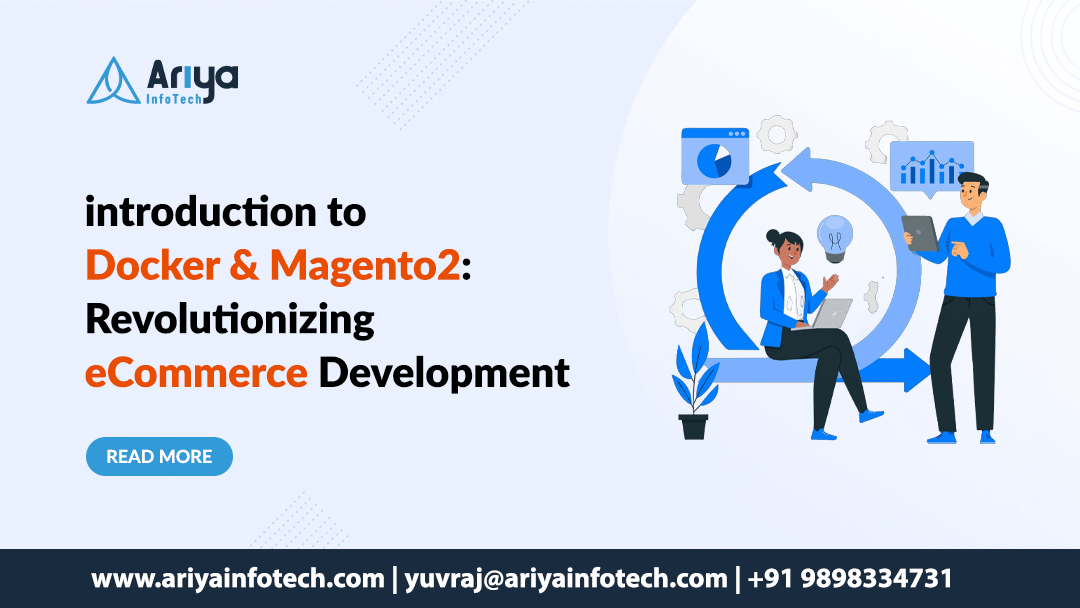Introduction to Docker & Magento2: Revolutionizing eCommerce Development

In today’s fast-paced eCommerce landscape, businesses need agile, scalable, and efficient solutions to stay ahead. Magento2 stands as one of the most powerful and feature-rich eCommerce platforms, offering flexibility and extensive customization. However, setting up and managing a Magento2 development environment can be daunting due to its complex architecture and multiple dependencies.
This is where Docker comes into play—a revolutionary tool that simplifies development, testing, and deployment by containerizing applications. By leveraging Docker, Magento2 developers can streamline workflows, improve consistency across environments, and enhance scalability. Let’s dive deeper into how Docker transforms Magento2 development.
What is Docker?
Docker is an open-source platform that allows developers to package applications and their dependencies into lightweight, portable containers. These containers can run seamlessly across different environments—whether on a local machine, a cloud server, or a production setup—eliminating the infamous “it works on my machine” issue.
By encapsulating the entire application environment within a container, Docker ensures stability, security, and ease of deployment. This approach is particularly beneficial for Magento2, given its intricate dependencies on services like PHP, MySQL, Elasticsearch, Redis, and Nginx.
Why Use Docker for Magento2?
1. Simplified Development
Setting up Magento2 manually involves installing multiple services, configuring dependencies, and ensuring compatibility across different operating systems. This process can be time-consuming and error-prone. Docker simplifies this by allowing developers to launch a fully functional Magento2 environment in minutes using pre configured containers, reducing setup time and minimizing configuration errors.
2. Consistency Across Environments
One of the biggest challenges in Magento2 development is maintaining consistency between development, staging, and production environments. Docker ensures that every instance of Magento2 runs identically across all stages, reducing debugging time and making transitions smoother.
3. Scalability and Performance
Unlike traditional virtual machines, Docker containers are lightweight and use fewer system resources. This enables developers to scale services like MySQL, Redis, and Elasticsearch dynamically, ensuring Magento2 can handle high traffic loads and large product catalogs efficiently.
4. Ease of Deployment
With Docker, Magento2 applications can be deployed effortlessly across different cloud platforms like AWS, Azure, and Google Cloud. Docker integrates seamlessly with Continuous Integration/Continuous Deployment (CI/CD) pipelines, enabling automated testing and rapid deployments with minimal downtime.
5. Enhanced Security and Isolation
Docker enhances security by isolating Magento2 applications and their dependencies within containers. This prevents system-wide conflicts and reduces vulnerabilities, ensuring a more secure development and production environment.
Getting Started with Docker and Magento2
To get started, install Docker and Docker Compose on your system. Then, create a docker-compose.yml file to define the required services for Magento2.
Essential Docker Services for Magento2
- Nginx for serving web pages
- PHP-FPM for executing PHP code
- MySQL for database management
- Redis for caching
- Elasticsearch for enhanced search capabilities
Sample Docker-Compose Configuration for Magento2
image: mysql:5.7
restart: always
environment:
MYSQL_ROOT_PASSWORD: root
MYSQL_DATABASE: magento2
MYSQL_USER: magento
MYSQL_PASSWORD: magento
ports:
– “3306:3306”
Running docker-compose up -d will launch a fully functional Magento 2 environment, eliminating the need for manual configuration.
Advanced Features of Docker for Magento2
-
Multi-Container Orchestration
Docker Compose allows you to manage multiple containers (e.g., Nginx, PHP, MySQL) as a single service. This simplifies the management of complex Magento 2 environments.
-
Volume Management
Docker volumes enable persistent storage for databases and application data, ensuring data is not lost when containers are restarted or updated.
-
Networking
Docker provides built-in networking capabilities, allowing containers to communicate securely with each other. This is crucial for Magento 2, where services like PHP, MySQL, and Redis need to interact seamlessly.
-
Custom Images
Developers can create custom Docker images tailored to specific Magento 2 requirements, such as pre-installed extensions or custom configurations.
-
Environment Variables
Docker supports environment variables, making it easy to configure Magento 2 settings (e.g., database credentials, API keys) without modifying the codebase.
Best Practices for Using Docker with Magento2
-
Use Official Images
Always use official Docker images for services like MySQL, PHP, and Nginx to ensure reliability and security.
-
Optimize Dockerfiles
Write efficient Dockerfiles to minimize image size and improve build times. For example, use multi-stage builds to reduce layers.
-
Leverage Docker Compose
Use Docker Compose to define and manage multi-container setups, ensuring consistency across environments.
-
Monitor Performance
Use tools like Docker Stats or third-party monitoring solutions to track container performance and resource usage.
-
Automate CI/CD Pipelines
Integrate Docker with CI/CD tools like Jenkins, GitLab CI, or GitHub Actions to automate testing and deployment processes.
Conclusion
By integrating Docker with Magento2, developers and businesses can significantly enhance efficiency, scalability, and deployment speed. Docker removes the complexity of setting up Magento2, ensures uniform performance across different environments, and streamlines workflows for better development and operational efficiency..
Why Choose Ariya InfoTech?
At Ariya InfoTech, led by Yuvraj Raulji, we specialize in delivering high-performance Magento2 solutions using cutting-edge technologies like Docker. Whether you need to optimize scalability, improve security, or streamline development workflows, our expertise can help you achieve your eCommerce goals efficiently.
Ready to transform your Magento2 store?
Contact Ariya InfoTech today and experience the future of eCommerce development with Docker!


